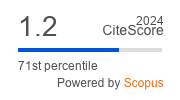"Little Things Make Big Things". A Psycholinguistic Analysis of Immigrants' Life Stories
Keywords:
acculturation, immigrants, cultural psychology, discourse, diatextual analysis.Abstract
Within the last decades, the global economical revolution which has invested the labor market has prompted calls for a redefinition of traditional human resource management practices. The rapid growth of ethnic diversity in the workplace has turned managers' attention to the management of difference. Yet, cross cultural management has become a priority for most organizations interested in improving competitiveness and in enhancing their human (multicultural) capital. In view of the above, the present study aimed at investigating the process of cultural integration experienced by a group of 12 immigrants workers employed in different Italian organizations. Moving from an applied psycholinguistics perspective, the study collected narrative interviews as to understand the impact that the new cultural experience may have had on the sense-making procedures used to integrate and reshape their personal and professional identity. The discursive data were processed through Diatextual Analysis as to catch the psychological and linguistic features binding identities to texts and to contexts of experience.
References
- Berry, J. W. (1974). Psychological aspects of cultural pluralism: Unity and identity
reconsidered. Topics in Cultural Learning, 2, 17–22. - Berry, J. W. (1992). Acculturation and adaptation in a new society. International
Migration Review, 30, 69–85. - Berry, J. W. (1997). Immigration, acculturation, and adaptation. Applied Psychology:
An International Review, 46, 5–34. - Berry, J. W. (2001). A psychology of immigration. Journal of Social Issues, 57,
615–631. - Caligiuri, P., (2000). Selecting expatriates for personality characteristics: A moderating
effect of personality on the relationship between host national contact and cross-cultural
adjustment. Management International Review, 40(1), 61–80. - Hofstede, G. (1984). Culture’s Consequences: International Differences in WorkRelated Values. Newbury Park, CA: Sage.
- Hofstede, G. (2001). Culture’s Consequences: Comparing Values, Behaviors,
Institutions, and Organizations Across Nations. Thousand Oaks, CA: Sage. - Lakey, P., (2003). Acculturation: a review of the literature, Intercultural
Communication Studies, XII-2, 103–118. - Larsson, R., & Lubatkin, M., (2001). Achieving Acculturation in Mergers and
Acquisitions: An International Case Survey, Human Relations, 54(12), 1573–160. - Manuti A. & Mininni G. (2013). Narrating organizational change: an applied
psycholinguistic perspective on organizational identity. Text & Talk, 33(2), 213–232. - Manuti, A., Traversa, R. & Mininni, G. (2012). The dynamics of sense making: a
diatextual approach to the intersubjectivity of discourse, Text and Talk, 32(1), 39–61. - Mininni G. (2005). Diatexts as a mirror of human complexity. World Futures: The
Journal of General Evolution, 61: 165–173. - Mininni, G., Manuti., A., Scardigno,, R., & Rubino, R., (2014). Old roots, new
branches: The shoots of diatextual analysis, Qualitative Research in Psychology, 11, 1–16. - Redfield, R., Linton, R., & Herskovits, M.J. (1936) Memorandum for the study of
acculturation. American Anthropologist, 38, 149–152. - Richard, O., Barnett, T., Dweyer, S., & Chadwick, K. (2004). Cultural diversity in
management, firm Performance, and the moderating role of Entrepreneurial orientation
dimensions, Academy of Management Journal, 47(2), 255–26. - Rudmin, F., (2003). Critical history of the acculturation psychology of assimilation,
separation, integration, and marginalization. Review of General Psychology, 7(1), 3–37. - Schwartz, S. H. (1992). Universals in the content and structure of values: Theoretical
advances and empirical tests in 20 countries. In M. Zanna (Ed.), Advances in Experimental Social
Psychology, 25 (pp. 1–65). Orlando, FL: Academics. - Schwartz, S., Montgomery M., & Briones, E., (2006). The role of identity in
acculturation among immigrant people: theoretical propositions, empirical questions, and applied
recommendations. Human Development, 49, 1–30 . - Slama-Cazacu T. (1961). Langage et Contexte. The Hague: Mouton.
- Taras, V., Rowney, J., & Steel, P., (2013). Work-related acculturation: change in
individual work-related cultural values following immigration, The International Journal of
Human Resource Management, 24(1), 130–151. - Templer, K., Tay, C., & Chandrasekar, N., (2006). Motivational cultural intelligence,
realistic job preview, realistic living conditions preview, and cross-cultural adjustment. Group &
Organization Management, 31(1), 154–173. - Verkyuten, M., (2005). Immigration discourses and their impact on multiculturalism: A
discursive an experimental study, British Journal of Social Psychology, 44: 223–240.







 Creative Commons «Attribution» 4.0
Creative Commons «Attribution» 4.0